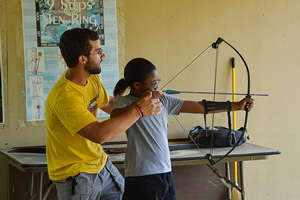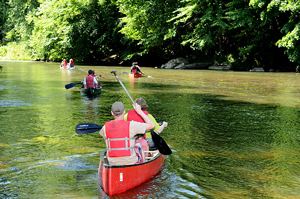
Source: Camp Seale Harris Family Week 2013, Camp Seale Harris, Flickr
Most writing is intended to inform or explain, persuade, entertain, or describe. When you can identify an author’s purpose for writing a text, you are better able to make decisions about what you are reading and decide whether you want to use the information that is in the text.
Sometimes writers write
- to tell a story;
- to provide information;
- to explain how to do something;
- to persuade someone to believe as they do;
- to describe an object, process, or place; or
- to express feeling.
Sometimes writers are explicit with their purpose. They directly state their reason for writing. Sometimes the title will even help you understand the purpose. An essay titled “Why Kids Should Go to Sleepover Camp” is going to be an argument for going to a camp that is away from home. The writer wants to persuade you to agree with him or her or at least to understand his or her position. Most of the time, it isn’t that easy to identify a writer’s purpose because the purpose is implicit. That means you will have to use your reading skills to make inferences that help you find the purpose.

Source: Camp Provides Safe Summer Fun for Kids With Asthma, Christiana Care, Flickr
One of the ways to help you infer the purpose is to find the main idea of the text. Ask yourself the question, “What am I to understand from the text?”
After you’ve answered that question and found the main idea of the text, then ask yourself, “Why has the writer told me these things? What does the writer want me to do with this new knowledge? How do I react to what the text says?”
 Let’s look at the following examples of texts about summer camp. When you’ve finished reading, answer the questions that follow using your notes. Then, check your understanding to see sample responses.
Let’s look at the following examples of texts about summer camp. When you’ve finished reading, answer the questions that follow using your notes. Then, check your understanding to see sample responses. Because I had such a wonderful summer camp experience as a child, I want to explain to you why it’s important for children to experience summer camps. Summer camps can provide a wonderful alternative for children dominated by adults with their endless rules. Joan Almon, co-founder of The Alliance for Childhood says, “It’s time to let children play and explore the world on their own terms with some adult support but as little adult direction as possible. . . . And while they’re relaxed and playing, maybe we could follow their lead."
It’s time for a resurgence of the nature-based summer camp experience.
A growing body of scientific knowledge indicates just how much children (and adults) can benefit from a walk in the woods. Researchers report that time spent in the great outdoors, including nearby urban nature, can improve self-confidence and help reduce symptoms of attention deficit hyperactivity disorder.
Mary Brown, a past member of the board of directors of the American Academy of Pediatrics, writes, “If we stress a connection to the natural environment . . . we can lessen the lifelong effects of a stressful childhood including depression, obesity, behavior problems, drug use and risk-taking behavior.” Some pediatricians are so impressed by these studies that they’re prescribing Vitamin N (for nature).
- Which of these texts explicitly states its purpose?
- What is the main idea of the first text?
- What is the purpose of the first text?
- What is the main idea of the second text?
- Why is the writer telling the reader this information?
- What can you do with this knowledge?
- What is the purpose of the second text?
- The first text explicitly states its purpose.
- The main idea of the first text is that summer camps allow children to play without constant adult interference.
- The author states in the first sentence that she wants to “explain” why going to summer camp is important.
- The main idea of the second text is how being in nature can benefit us in many ways.
- I think the author is telling the reader this information so that we will experience nature more.
- I can think about this text and work to get out in nature more because I understand how it affects us in good ways.
- The purpose of the second text is also to explain. The author explains why nature is beneficial to children.